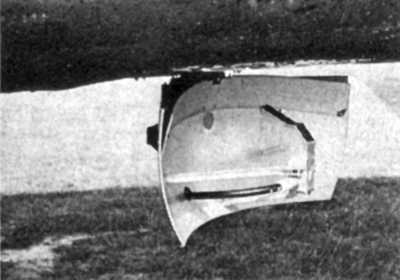H2S
Description of the radar set, tactical-technical characteristics

Figure 1: Radome covering the antenna H2S in a Halifax bomber (source: British Government)
| Specifications of Lichtenstein C-1 | |
|---|---|
| frequency: | 3.3 GHz |
| pulse repetition time (PRT): | |
| pulse repetition frequency (PRF): | |
| pulsewidth (τ): | |
| receive time: | |
| dead time: | |
| peak power: | 50 kW |
| average power: | |
| instrumented range: | 80 km |
| range resolution: | ±300 m |
| accuracy: | |
| beamwidth: | |
| hits per scan: | |
| antenna rotation: | 60 rpm |
| MTBCF: | |
| MTTR: | |
H2S
The H2S is an English onboard panorama radar (code name “Home Sweet Home”). It is fitted with a magnetron that produces a pulse power of P=50kW with a wave length of λ=9.1cm. Its parabola antenna has horizontal polarization and rotates at 60 rpm. The panorama image is projected on a CRT. At a test flight in October 1941 a test device developed for night fighter planes shows a recognizable image of Southampton.
In August 1942 the device was ready for production and its prompt installation in bombers is ordered. During the night of 30/31 January 1943 bombers equipped with H2S radar are used as scouts of the attack on Hamburg.
